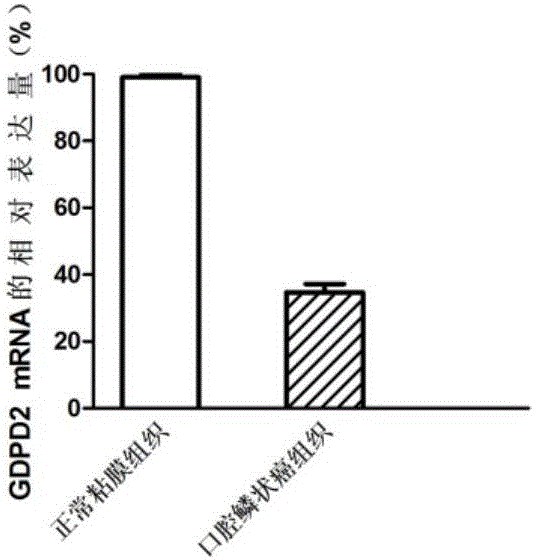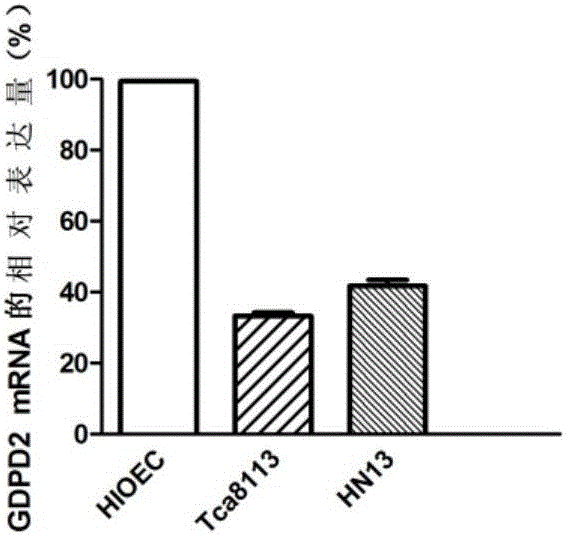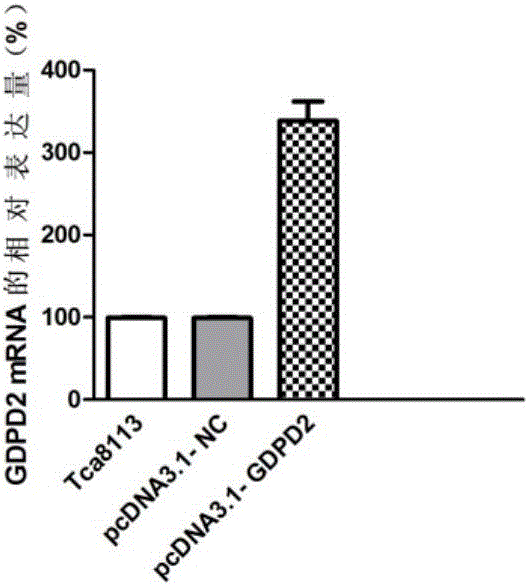Application of molecular marker to diagnosis and treatment of oral squamous cell carcinoma
A squamous cell carcinoma and oral cavity technology, which is applied in the application field of molecular markers in the diagnosis and treatment of oral squamous cell carcinoma, can solve the problems that the tumor cannot be cured, the operation is difficult to perform, and the curative effect of immunotherapy is not obvious.
- Summary
- Abstract
- Description
- Claims
- Application Information
AI Technical Summary
Problems solved by technology
Method used
Image
Examples
Embodiment 1
[0060] Example 1 Screening for Gene Markers Related to Oral Squamous Cell Carcinoma
[0061] 1. Sample collection
[0062] 6 cases of surrounding normal mucosa tissue and oral squamous cell carcinoma tissue were collected, all of which were confirmed by pathological diagnosis. All patients did not receive any form of treatment before operation. The surgically resected samples were frozen in liquid nitrogen, and the patients gave informed consent, and all the above-mentioned samples were obtained with the consent of the organizational ethics committee.
[0063] 2. Preparation of RNA samples (operated using QIAGEN tissue RNA extraction kit)
[0064] Take out the tissue samples frozen in liquid nitrogen, put the tissue samples into a pre-cooled mortar for grinding, and extract and isolate RNA according to the instructions in the kit. details as follows:
[0065] 1) Add Trizol and place at room temperature for 5 minutes;
[0066] 2) Add 0.2ml of chloroform, vibrate the centrif...
Embodiment 2
[0079] Example 2 QPCR sequencing to verify differential expression of GDPD2 gene
[0080] 1. Large-sample QPCR verification of differential expression of GDPD2 gene. According to the sample collection method in Example 1, 80 cases of normal mucosal tissues and 80 cases of oral squamous cell carcinoma tissues were selected.
[0081] 2. RNA extraction The steps are as described in Example 1.
[0082] 3. Reverse transcription:
[0083] 1) Reaction system:
[0084]
[0085] 2) Reverse transcription reaction conditions
[0086] According to the reverse transcription reaction conditions in RNA PCR Kit (AMV) Ver.3.0.
[0087] 60min at 42°C, 2min at 99°C, 5min at 5°C.
[0088] 3) Polymerase chain reaction
[0089] 1) Primer design
[0090] QPCR amplification primers were designed according to the coding sequences of GDPD2 gene and GAPDH gene in Genebank, and synthesized by Biomed Biotech. The specific primer sequences are as follows:
[0091] GDPD2 gene:
[0092] The forw...
Embodiment 3
[0105] Example 3 Differential expression of GDPD2 gene in oral squamous cell carcinoma cell lines
[0106] 1. Cell culture
[0107] Oral squamous cell carcinoma cell lines Tca8113 and HN13, and normal mucosal epithelial cell line HIOEC were purchased from the Ninth People's Hospital Affiliated to Shanghai Jiaotong University. The medium of HIOEC is K-SFM; the medium of Tca8113 and HN13 is DMEM; the culture medium containing 10% fetal bovine serum and 1% P / S was incubated at 37°C and 5% CO 2 , Cultivated in an incubator with a relative humidity of 90%. Change the medium once every 2-3 days, and use 0.25% EDTA-containing trypsin for routine digestion and passage.
[0108] 2. Extraction of total cellular RNA
[0109] 1) Stop the culture when the cells reach 80-90% confluency, digest with 0.25% trypsin and collect the cells in 1.5ml EP tubes, add lm1Trizol to each tube and shake slowly to break the cells, place on ice for 10min.
PUM
 Login to View More
Login to View More Abstract
Description
Claims
Application Information
 Login to View More
Login to View More - R&D Engineer
- R&D Manager
- IP Professional
- Industry Leading Data Capabilities
- Powerful AI technology
- Patent DNA Extraction
Browse by: Latest US Patents, China's latest patents, Technical Efficacy Thesaurus, Application Domain, Technology Topic, Popular Technical Reports.
© 2024 PatSnap. All rights reserved.Legal|Privacy policy|Modern Slavery Act Transparency Statement|Sitemap|About US| Contact US: help@patsnap.com










